Having a betta fish that’s lost its appetite is a worry many of us betta owners have faced. It can be concerning to see your little aquatic friend not showing interest in their food. The good news is, there are steps you can take before reaching out to a veterinarian for help.
Most of these issues are related to how we care for our bettas, and making a few simple changes can make a big difference in getting your betta back to its normal eating routine. Let’s explore the reasons why Betta fish not eating, so you can help your betta thrive once again.
Top 10 Reasons of Betta Fish Not Eating
If you’ve noticed that your beloved betta fish isn’t eating as it should, it’s essential to find out what might be bothering it. Just like us, fish can have reasons for losing their appetite. Let’s explore these reasons together and learn how to help your fish feel better.
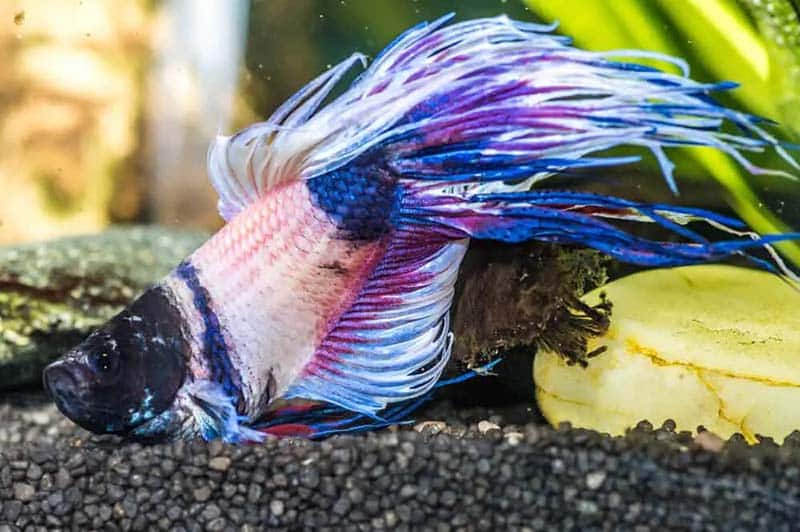
1. New Environment
Imagine moving to a new place – it can be overwhelming, right? Well, betta fish feel the same way when they’re introduced to a new home. For the first few days, they might be too nervous to eat as they adjust to their new surroundings. Give them some time to settle in.
2. Poor Water Quality
Now, think of living in a dirty room with smelly air. Not a pleasant thought, is it? Betta fish are very sensitive to the cleanliness of their water. If the water they swim in is contaminated with ammonia, nitrites, or high nitrate levels, it can make them stressed and unwell. Regularly test your water quality and perform water changes when necessary to keep their environment healthy.
3. Inappropriate Temperature
Just like we prefer a comfortable room temperature, betta fish have their temperature preferences. They thrive in water that’s consistently warm, around 78-80°F (25-27°C). You can use a heater and thermometer to make sure the water stays in this cozy range. If the water temperature fluctuates too much, it can stress out your betta and lead to loss of appetite.
4. Betta Fish Wont eat Because Overfeeding
Overfeeding can be a reason why your betta fish suddenly stops eating. Betta fish have hearty appetites and are quite eager to devour any food you offer them. However, this eagerness can sometimes lead to unintended consequences.
Much like us, bettas have a limit to how much they can eat and properly digest. When they consume more than they can handle, their gastrointestinal system can become overwhelmed. This means their metabolism can’t keep up with processing all that food. The result is a buildup of undigested food in their stomach, which can lead to bloating.
If you’ve been overfeeding betta fish, you might notice that their belly looks inflated, almost resembling a balloon. This is a clear indication that they’ve had more than their fair share of food.
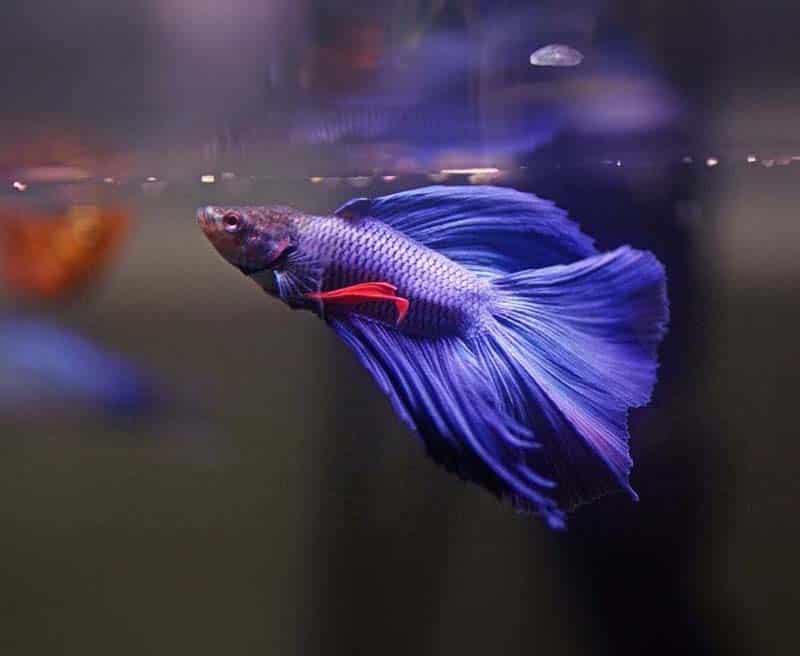
To prevent overfeeding, it’s essential to maintain a consistent feeding schedule. Most bettas thrive with two feedings a day. Offer only the amount of food they can consume within a few minutes. Any leftover food should be removed promptly from the tank to prevent them from overindulging.
5. Betta Fish Disease: Refusal to Eat
When a betta fish is unwell, it often loses its appetite. If you can’t pinpoint any other reason for your betta’s lack of interest in food, it’s crucial to watch for signs of illness. A sick betta may exhibit symptoms such as torn or damaged fins, changes in coloration, or increased lethargy. Whether these signs are mild or severe, seeking professional help from a vet is the best course of action.
The sooner you begin treatment, the better the chances of your betta’s recovery. Prioritizing your betta’s health and well-being by addressing illness promptly can make a significant difference in their quality of life.
6. Old Age
As betta fish near the end of their lifespan, which typically spans around 3-5 years but can vary, you may notice changes in their eating habits. It’s not uncommon for aging bettas to eat less or even stop eating altogether. Just like humans and many other living creatures, bettas can experience a natural decline in their appetite and overall activity as they reach the later stages of their lives. During this time, it’s essential to continue providing a comfortable and stress-free environment for your betta and offer them food in case they do feel like eating.
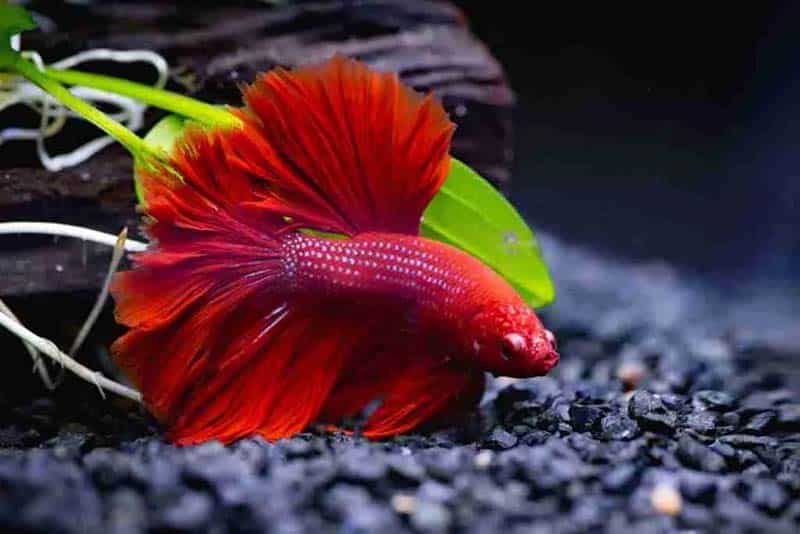
7. Type of Food
Bettas can indeed be quite selective when it comes to their food preferences. If you’ve recently changed the type of food you’re offering and your betta isn’t showing much interest, it’s possible that they don’t like the new food. To address this, consider trying a different high-quality pellet or frozen food option. Sometimes, a change in taste or texture can pique their interest and encourage them to eat.
8. Swim Bladder Disease
Swim bladder disease is a common ailment among bettas. This condition often manifests with symptoms such as the fish floating on its side, having difficulty swimming, or struggling to reach the bottom of the tank. Swim bladder issues can be linked to overfeeding or providing the wrong type of food to your betta.
9. Betta Stress May Refuse to Aat
Bettas, despite their tough reputation, can be surprisingly sensitive creatures. Contrary to popular belief, they can get stressed quite easily. Stress is a common reason why betta fish may refuse to eat, and it can manifest through various symptoms, including lethargy and loss of appetite. Understanding and addressing the factors that might be causing stress in your betta is crucial for their overall well-being and appetite.
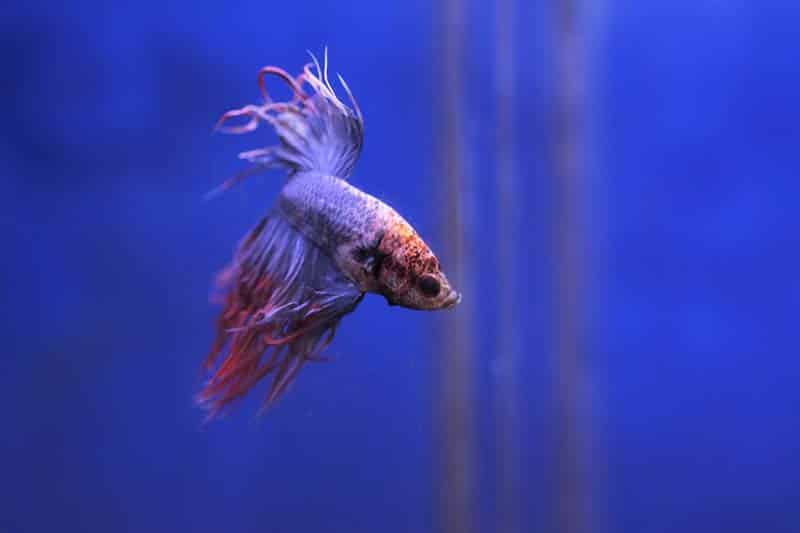
10. Female Bettas May Eat Less
It’s important to note that female bettas may eat less or even stop eating when they are full of eggs. Similarly, male bettas might not have much of an appetite when they are busy caring for their bubble nest. These natural behaviors are related to their breeding instincts. During these periods, it’s entirely normal for bettas to prioritize their reproductive activities over food consumption.
What to Do If Your Betta Fish Is Not Eating?
If you find that your betta fish isn’t eating, follow these steps to help improve their appetite and overall well-being:
- Test Water Quality: Check the water chemistry, focusing on parameters like temperature. Ensure they are within the appropriate range for bettas. Gradually correct any imbalances to avoid stressing your fish.
- Evaluate Diet: Examine the food you’re offering. If it’s old or suspicious, replace it with a fresh pack. Consider offering live or freeze-dried foods to entice picky eaters.
- Maintain Clean Environment: Keep the aquarium as clean as possible by monitoring water parameters and performing regular water changes. Check for any sudden spikes in chemical levels.
- Monitor Temperature: Ensure the water temperature remains steady between 74 and 82 degrees Fahrenheit. Sudden fluctuations can distress your betta.
- Provide Adequate Space and Hiding Places: Offer enough space and hiding spots in the tank to reduce stress levels, allowing your betta to feel secure and comfortable.
- Check for Illnesses: Inspect your betta for signs of illness. If you suspect any health issues, promptly seek appropriate treatment.
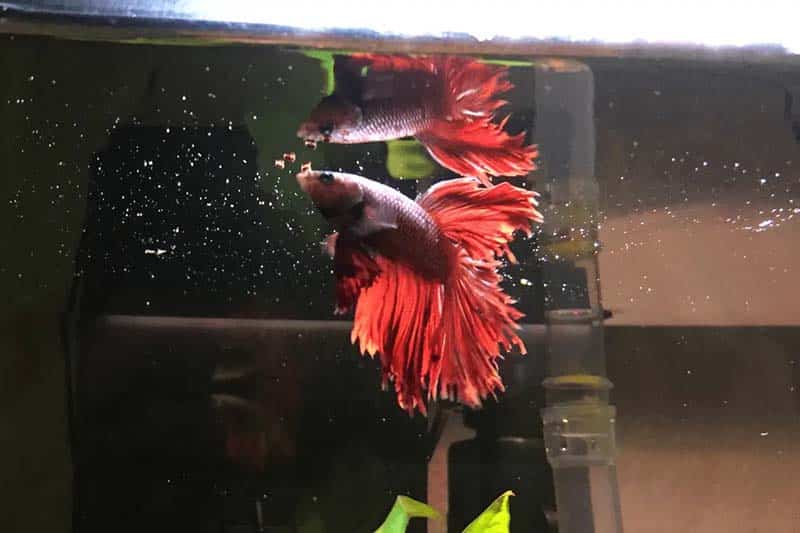
Conclusion
In conclusion, ensuring your Betta fish maintains a healthy appetite involves addressing various factors, and we’ve outlined the top 10 reasons Betta fish not eating to guide you. Remember, a well-fed Betta is a happy Betta!
Explore more articles on Betta care and all things aquarium-related at National Park Aquarium. Happy fish-keeping and here’s to a vibrant, thriving aquatic world in your very own home!
Learn about:
- 7 reasons why your betta fish spitting out food
- How to feed betta fish (how often and how much)?
- How long can beta fish go without eating (3, 5 or 7Days)




